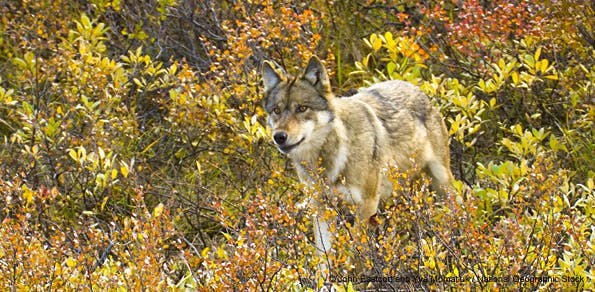It wasn’t so very long ago that the sight of a gray wolf in the northern Rockies was a reason to celebrate. It meant that the hard work of thousands of people for many years was finally paying off, and a species that was nearly snuffed out entirely was beginning to set down roots in its native habitat once again. As a biologist in charge of endangered species conservation for the U.S. Fish and Wildlife Service at the time of the wolf reintroduction into the northern Rockies, I was deeply involved in working on the release. Knowing we were finally restoring a key missing piece of the northern Rockies ecosystem was a highlight of my career, and incredibly exciting.
Today, however, I’m stunned that we are fighting to save the same species from the very people who should be working to keep it safe. The U.S. Fish & Wildlife Service has decided, without the scientific data to prove it, that gray wolves no longer require the protection of the Endangered Species Act in the state of Wyoming. They’ve made the same delisting decision before, in Idaho and in Montana — delistings that led to the killing of hundreds of wolves. While the management plans in Montana and Idaho are extremely troubling, Wyoming’s wolf management plan is much worse. Under that plan, wolves in most of the state will be treated as vermin that can be killed at any time, for any reason, or no reason at all. Wyoming intends to drive wolves down to the smallest population they can — just above the threshold that could land the species back on the endangered species list. That is no way to manage wolves. In fact, it is unlike any other plan to manage similar wildlife in the area, like mountain lions and bears. Clearly, the ability for wolves to fulfill their natural ecological role in maintaining healthy, balanced ecosystems will be severely compromised, casting their long term recovery into serious doubt. This approach would also cut off routes for wolves dispersing to Colorado or Utah, making it nearly impossible for northern gray wolves to ever return to these important parts of their historic range.
 That such a plan could even be entertained is shocking. How could reckless, unregulated killing of wolves be considered a credible plan for a species just barely returned to the region? But even more distressing is the seemingly unqualified support that this plan is receiving. The U.S. Fish and Wildlife Service. The Department of the Interior. The Obama Administration. These are the voices that should be railing against a plan so completely lacking in scientific reasoning, and so clearly inadequate to sustaining a healthy population of wolves in the region. Instead, they are lowering the bar for the Endangered Species Act, and diminishing what it means to recover imperiled species.
That such a plan could even be entertained is shocking. How could reckless, unregulated killing of wolves be considered a credible plan for a species just barely returned to the region? But even more distressing is the seemingly unqualified support that this plan is receiving. The U.S. Fish and Wildlife Service. The Department of the Interior. The Obama Administration. These are the voices that should be railing against a plan so completely lacking in scientific reasoning, and so clearly inadequate to sustaining a healthy population of wolves in the region. Instead, they are lowering the bar for the Endangered Species Act, and diminishing what it means to recover imperiled species.
If it seems like this decision cannot possibly have been based on sound science, it’s because it wasn’t. It was based on politics. The Obama Administration wants to be able to point to delisted wolves and say, “Look! The Endangered Species Act works!” I can’t blame them for wanting to say that wolves are recovered — I’d love to be able to say it too. The truth is, the Endangered Species Act can and does work, and gray wolves in the Northern Rockies have made a tremendous comeback. But the recovery isn’t truly complete until the state plans guarantee the long-term sustainability of wolves in the region, using the best available science and long-trusted wildlife management goals and standards.
President Obama and his administration have prided themselves on bringing science-based decision making back to the White House. But now, when the need for science and reason is critical, the White House is eerily silent. For all of them — for the Fish and Wildlife Service, the Department of the Interior, for the Obama White House itself — the problem isn’t a lack of scientific reasoning; it’s a lack of political will and courage. It appears that it is safer to claim a hollow victory than to keep working toward a real one. It is easier to say “job well done” than to keep working until it really is.
The Administration may have abandoned the Endangered Species Act with this decision, but I can’t. Having spent years pursuing protection and stability for our most threatened and vulnerable species, I can’t stand by and watch as the administration undermines 40 years of recovery for gray wolves. At Defenders of Wildlife, we’re ready to throw all our weight behind this effort. We’re continuing to talk to the White House and the relevant agencies to show them that this plan cannot be put into action. And if, as we suspect, the delisting is announced in the coming days, we are ready to take the fight to the courtroom. Your support — whether through donations, advocacy, or simply spreading the word — will be invaluable as we pursue this course, and I thank you sincerely for standing with us, and standing up for wolves.




